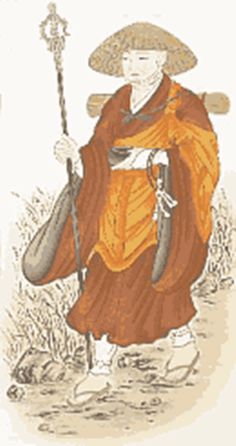Saru-mo Ki-kara Ochiru/Kobo-mo Fude-no Ayamari
(Saru-mo Ki-kara Ochiru <= Homer sometimes nods>!?)
When you look up those proverbs in the dictionary, you will always find the translation – “Homer sometimes nods.” Yes, this means “A good marksman may miss.” Nobody can avoid making mistakes from time to time. Even Ironman, a Marvel Hero, made lots of mistakes, didn’t he? So, its translation is done. Are you happy? If so, this column ends here…
Wait a second! That is NOT what I meant to say. You came all the way – how far? – to my website. So, I need to tell you something special so you will feel it was worth your time!
If you ever know Japanese, you know what “Saru” means in Japanese. Right? Who in the world is “Kobo” then? Do you know? That is the precious information (jewel) for YOU!
(Kobo Daishi)
Kobo Daishi (1185 – 1333), which, according to Wikipedia, means “The Grand Master Who Propagated the Buddhist Teaching.” In Japan, Kobo Daish is widely known as “Kukai (Buddhist Name: https://en.wikipedia.org/wiki/K%C5%ABkai).” For the Japanese, historically speaking, Kobo Daishi is an Ironman. He is a super human. He can do anything (I doubt it…). That is what the Japanese believe. Of course, his handwriting is art. This historical figure has nothing to be desired.
So, the proverb goes, “Kobo-mo Fude-no Ayamari,” which literally means that even Kobo Daishi makes a mistake or two when writing. In other words, you don’t worry too much about your mistake when even Kobo Daishi can make mistakes. Like this, you will encounter the name of “Kobo Daishi” very often when the Japanese start to talk about super human figures or achievements. Kobo Daishi is an excellent example of somebody so idealistic!
Since he is someone special, who has nothing to be desired, the name of Kobo Daishi is used in another proverb – “Kobo Fude-wo Erabazu.” Literally it means that Kobo Daishi doesn’t choose his brushes when writing. You know a lot of people, regarding writing for example, who make tons of excuses when they do awful jobs, putting blames on the tools – pens of some sort – they used. Because of the flaws of their tool, according to them, they couldn’t write very well. This is applicable to any situation like that. Those certain people are always blaming their “tools,” whether or not they do on purpose or not, for their poor jobs. Kobo Daishi was such a mastery calligrapher that he could write amazingly well even though he used tools (brushes) of poor quality. Accordingly, this proverb is translated into English like this: “A bad [ill] workman quarrels with his tools.” Blame yourself when you make mistakes, NOT your tools!
Learn Japanese with ME!
You will become a “Kobo Daishi” in Japanese!
Special Trial Lesson $19.99 <– Click here!
This deal expires on Christmas Day!
Hurry!





